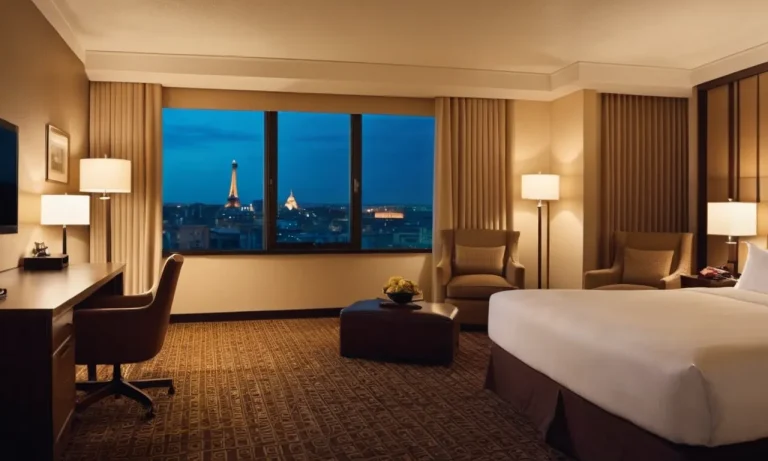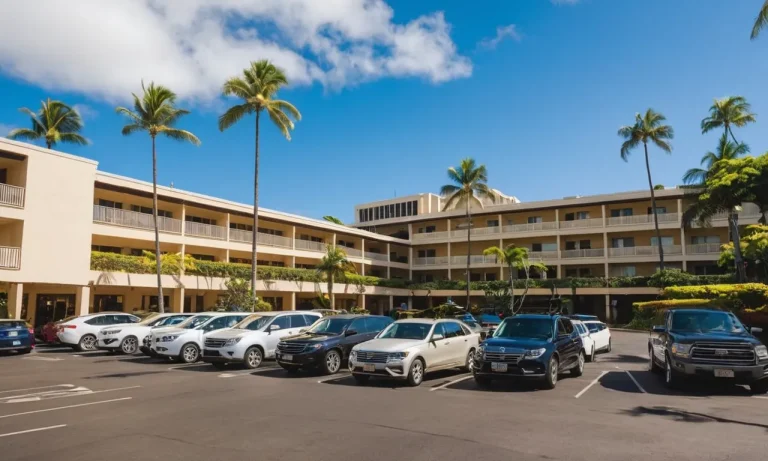Can You Use A Hotel As A Residential Address?
In today’s fast-paced world, where mobility and flexibility are becoming increasingly important, the question of using a hotel as a residential address has gained significant attention. Whether you’re a digital nomad, a frequent traveler, or someone seeking temporary accommodation, understanding the legalities and implications of this practice is crucial.
If you’re short on time, here’s a quick answer to your question: Using a hotel as a residential address is generally possible, but it comes with certain limitations and requirements that vary depending on the location and the specific circumstances.
In this comprehensive article, we’ll delve into the details of using a hotel as a residential address, exploring the legal aspects, practical considerations, and potential challenges. We’ll also provide insights into alternative solutions and tips for navigating this unique living situation.
Legal Considerations
Using a hotel as a residential address can be a tricky legal matter with various implications. It’s crucial to understand the residency requirements, proof of address regulations, and potential tax consequences before making this decision.
Residency Requirements
Most cities and states have specific residency requirements that define what qualifies as a legal residence. Generally, a residential address is a place where you physically reside and intend to remain for an extended period.
Hotels, by their nature, are designed for temporary stays, and using them as a permanent address may not meet the residency criteria. However, some hotels offer long-term stay options, which could potentially qualify as a residential address, depending on local laws and regulations.
It’s advisable to consult with local authorities or a legal professional to ensure compliance with residency requirements in your area.
Proof of Address
Many governmental and private organizations require proof of address for various purposes, such as obtaining identification documents, registering for services, or applying for benefits. Using a hotel address as your primary residence may raise questions and require additional documentation or verification.
Some hotels may provide residents with a letter or statement confirming their stay, but this may not be accepted as a valid proof of address by all entities. It’s essential to check with the specific organizations you’ll be dealing with to understand their requirements and any potential challenges you might face.
Tax Implications
Living in a hotel can have tax implications that differ from traditional residential situations. Depending on the duration of your stay and local tax laws, you may be subject to hotel occupancy taxes or other fees that are typically applied to short-term stays.
Additionally, if you plan to work or conduct business from the hotel, there could be tax implications related to home office deductions or business expenses. According to the IRS website, you may be able to deduct certain expenses related to using a portion of your hotel room as a home office, but specific requirements must be met.
It’s advisable to consult with a tax professional to understand the potential tax implications and ensure compliance with applicable laws.
Furthermore, the cost of long-term hotel stays can be significantly higher than traditional rental or mortgage payments, which may impact your overall financial situation and tax liabilities. It’s estimated that the average daily rate for a hotel room in the United States was around $147 in 2022, according to data from STR 😮.
Weighing the costs and benefits of using a hotel as a residential address is crucial to make an informed decision.
Practical Aspects
Long-term Hotel Stays
While hotels are primarily designed for short-term stays, many establishments accommodate guests who require longer residencies. According to a study by the American Hotel & Lodging Association, approximately 20% of hotel bookings in the US are for extended stays 👨💼.
These “long-term” hotel guests often include business travelers, consultants, or individuals in transition between permanent residences.
Hotels catering to this market offer amenities tailored for extended stays, such as kitchenettes, laundry facilities, and discounted rates for longer bookings. Some even provide monthly or semi-annual rental options, blurring the lines between traditional hotels and serviced apartments.
Reputable chains like Extended Stay America and Marriott Residences have built their brand around this concept.
Mail and Package Delivery
One practical consideration for using a hotel as a residential address is the ability to receive mail and packages. Most hotels can accommodate this, either through a dedicated mailroom or by holding deliveries at the front desk.
However, it’s essential to check with the hotel’s policies and procedures beforehand. Some establishments may charge additional fees for mail handling or have restrictions on package sizes.
It’s also worth noting that using a hotel address for official purposes, such as registering to vote or obtaining a driver’s license, may not be permitted in certain jurisdictions. Always verify the local regulations and requirements before relying on a hotel address for legal or government-related matters 🧐.
Amenities and Services
One of the significant advantages of residing in a hotel is the array of amenities and services at your disposal. From housekeeping and room service to fitness centers and pools, hotels offer a level of convenience and luxury that can be challenging to replicate in a traditional residential setting.
Don’t underestimate the joy of having your bed made and towels refreshed daily! 😍
Additionally, many hotels provide business centers, meeting rooms, and even coworking spaces, making them an attractive option for remote workers or entrepreneurs seeking a productive environment outside their living quarters.
According to a survey by Hotel News Resource, 67% of business travelers prefer hotels with robust amenities and services when working remotely.
| Amenity/Service | Typical Hotel Offering |
|---|---|
| Housekeeping | Daily room cleaning and linen changes |
| Dining | On-site restaurants, room service, and bar/lounge areas |
| Fitness | Gyms, pools, and sometimes spas or wellness centers |
| Business | Meeting rooms, business centers, coworking spaces |
Challenges and Limitations
Cost and Affordability
While the idea of using a hotel as a residential address might sound convenient, it comes with a hefty price tag. Hotel rates, even for extended stays, can quickly add up and become a significant financial burden.
According to a study by Statista, the average daily rate for hotels in the United States in 2021 was around $124. 😲 Over the course of a year, that could easily amount to tens of thousands of dollars! Unless you have a substantial budget or a generous employer footing the bill, the cost of living in a hotel long-term can be prohibitively expensive.
Privacy and Security
While hotels strive to provide a safe and secure environment for their guests, the constant flow of people coming and going can pose privacy and security risks for long-term residents. 🔒 Hotel staff, cleaning crews, and other guests have access to common areas and hallways, potentially compromising your personal space and belongings.
Additionally, hotels may not offer the same level of security measures as traditional residential properties, such as secure entry systems or dedicated parking areas. If privacy and security are high priorities for you, a hotel setting might not be the ideal choice for a permanent address.
Lack of Permanence
One of the most significant drawbacks of using a hotel as a residential address is the lack of permanence. Hotels are designed for temporary stays, and they may not offer the same sense of stability and belonging that comes with a traditional home or apartment.
🏡 You might have to change rooms frequently, deal with fluctuating rates, and navigate ever-changing policies and regulations. This transient lifestyle can be challenging, especially if you’re looking for a more settled and grounded living situation.
Furthermore, some government agencies and institutions may not recognize a hotel address as a valid residential address, which could create complications when it comes to official documentation or services.
Alternative Solutions
Serviced Apartments
If using a hotel as a residential address is not an option, serviced apartments can be a great alternative. These fully-furnished apartments offer the convenience of hotel-like amenities with the added benefit of a more permanent living space.
Many serviced apartment providers, such as BridgeStreet, offer flexible lease terms, making them a suitable choice for those in need of temporary housing or extended stays.
According to a study by ApartmentService, the global serviced apartment industry is expected to grow at a compound annual growth rate (CAGR) of 8.7% from 2022 to 2027, indicating an increasing demand for this type of accommodation.
🚀 Serviced apartments often come fully equipped with kitchens, separate living and sleeping areas, and other home-like amenities, making them an excellent alternative for those seeking a more residential feel without the hassle of traditional leases or utility setups.
Virtual Mailbox Services
If you’re in need of a physical address for mail and package delivery, virtual mailbox services can be a lifesaver. 📫 These services provide you with a real street address where your mail is received and securely stored until you’re ready to access it.
Companies like Traveling Mailbox and VirtualPostMail offer virtual mailbox services that can be a fantastic solution for digital nomads, frequent travelers, or anyone without a permanent residential address.
According to a report by Grand View Research, the global virtual mailbox market size was valued at $1.2 billion in 2022 and is expected to grow at a CAGR of 12.3% from 2023 to 2030. 📈 Virtual mailbox services often provide additional features like mail forwarding, package consolidation, and online mail management, making it easy to stay on top of your correspondence no matter where you are in the world.
Coworking Spaces
While coworking spaces are primarily designed for professionals seeking a collaborative and productive work environment, many of them also offer the option of using their address as a virtual office. 🏢 This can be a fantastic solution for freelancers, entrepreneurs, or small business owners who need a professional mailing address but don’t require a traditional office space.
According to a report by Coworking Resources, the global coworking space market is expected to grow at a CAGR of 24.8% from 2022 to 2030, driven by the increasing demand for flexible and collaborative workspaces.
🚀 Coworking spaces often provide additional services like meeting rooms, event spaces, and networking opportunities, making them a great option for those seeking a professional environment without the commitment of a traditional office lease.
Conclusion
Using a hotel as a residential address can be a viable option for those seeking flexibility and temporary accommodation, but it comes with its own set of legal, practical, and financial considerations.
While some locations may have specific regulations or restrictions, others may be more accommodating to this living arrangement.
Ultimately, the decision to use a hotel as a residential address should be carefully weighed against your individual needs, budget, and long-term goals. By understanding the potential challenges and exploring alternative solutions, you can make an informed choice that aligns with your lifestyle and preferences.
Whether you’re a digital nomad, a frequent traveler, or simply seeking a temporary living solution, this comprehensive guide has provided you with the necessary insights to navigate the complexities of using a hotel as a residential address.
Embrace the freedom and flexibility that this option offers, while being mindful of the associated considerations and limitations.








